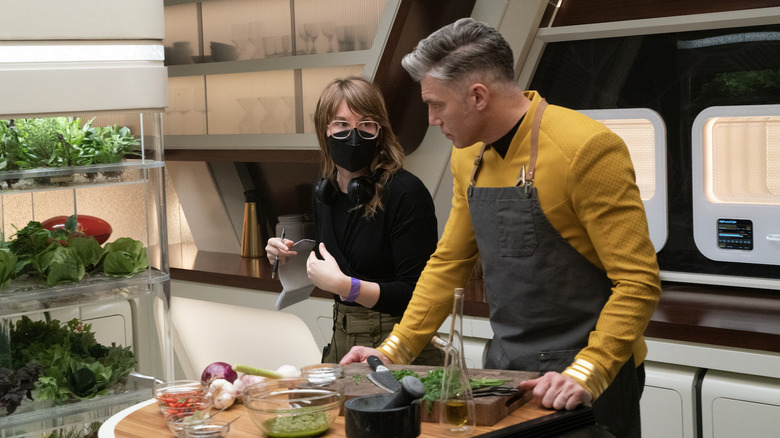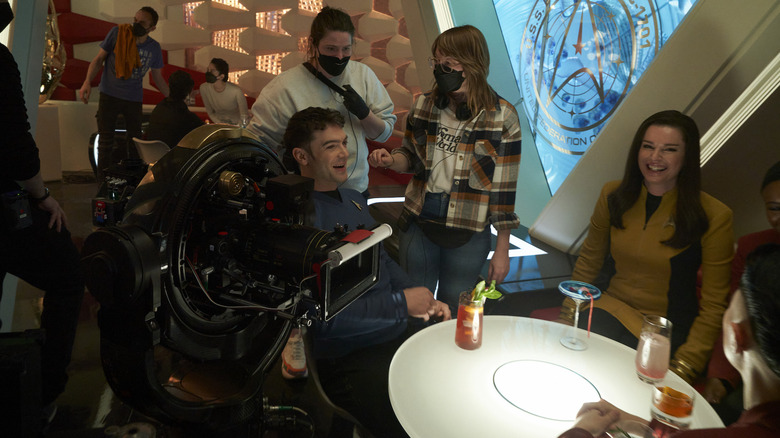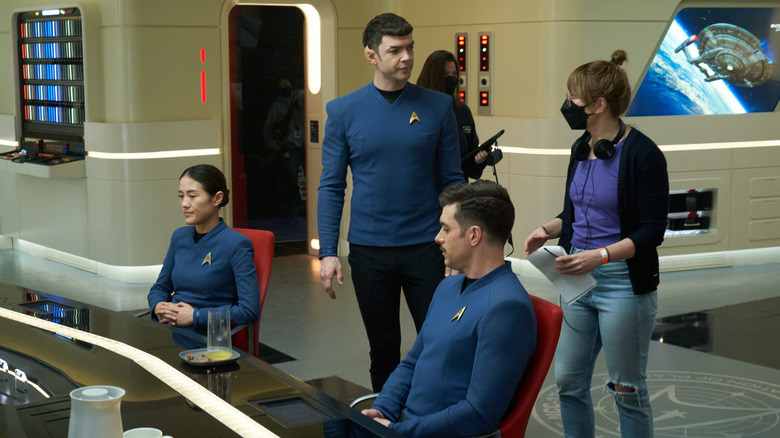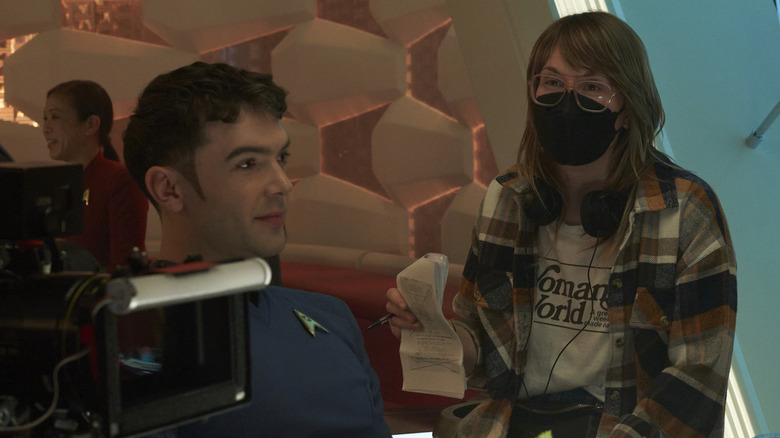How Strange New Worlds Director Jordan Canning Made The Funniest Star Trek Episode Ever [Exclusive Interview]
"Star Trek" is no stranger to comedy. For every high-minded Original Series episode, there was "The Trouble With Tribbles." For every philosophy-driven "Next Generation" adventure, there was a "Qpid." And remember "Profit and Lace" from "Deep Space Nine"? Of course you do. You don't want to remember it, but you do.
"Star Trek: Strange New Worlds" has embraced humor from the outset, but its latest episode, "Charades," is a full-blown rom-com. There's a love triangle, a shenanigan-infused plot to deceive disapproving in-laws, and a truly madcap performance from Ethan Peck, whose Spock finds his Vulcan DNA removed as he's forced to live as a human following a cosmic mishap. It's the funniest "Star Trek" episode ever made, and one whose humor is heightened by its powerful furthering of the love story between Spock and Nurse Chapel (Jess Bush).
Behind the camera for the episode was director Jordan Canning, a comedy TV veteran (and secret "Star Trek: The Next Generation" buff) who gives "Charades" a screwball spring in its step. Every frame of the episode is a gift, and the staging of each tensely goofy sequence reveals a true understanding of comedic blocking (just watch Anson Mount's Captain Pike in the background of virtually any group shot).
I spoke with Canning about making the episode, her "Trek" fandom, directing Vulcan characters, and finally bringing 60 years of "Trek" head canon to life with Spock and Chapel's big kiss.
Note: This interview has been lightly edited for clarity and brevity.
'Oh, great. This is now becoming a visual theme throughout'
This is the funniest episode of "Star Trek" ever made.
Oh my God. Jacob, stop.
I've seen all the classics, all the comedy episode from the '60s to the '90s, and this one pulls off the balance the best.
Thank you.
Since you do have a fair amount of TV comedy on your resume, were you a "Trek" fan first, or did they come to you because they knew you could pull off TV comedy?
Well, I think in terms of them approaching me to do an episode, I think they approached me not knowing that I loved "Star Trek: The Next Generation" when I was a kid. But I think they approached me because of my comedy background. But yeah, I like to say it's how me and my parents bonded when I was a kid was every night after dinner, we would watch "Star Trek: The Next Generation."
So that show in particular, and also the movie, "The Voyage Home," those were the beacons of "Star Trek" in my childhood and what I loved very much. I don't know every single episode and I didn't watch every single show, but I've always loved it. I feel like now I should just go back and watch everything. I've watched all the movies leading up to this. They're so good. Why didn't I ever watch these?
I want to talk about how you direct comedy, how you use the frame, because it's not just a point and shoot thing here. The amount of business happening, the staging, the blocking, what Anson Mount is doing in the background of various shots ... I want to know how you as a director use the frame to emphasize the joke instead of letting the joke play out.
This was such an awesome exercise in exactly what you just said in terms of finding visual ways to find more humor, either in terms of reactions or little moments of blocking that weren't necessarily scripted, and also in terms of the comedic framing. One of the many things that's so great about "Strange New Worlds" is that they really do give their directors a lot of freedom to play within the stylistic world of the tone of the episode.
So you can switch up the kind of shooting style based on it being a comedy, or a horror, or a musical, or whatever it's going to be. We, the director of photography, Glenn Keenan and I, I had storyboarded all the VFX sequences and had shot-listed, but as we started shooting, this really nice motif started to form of behind the head of Spock, this really nice symmetrical framing, centering Spock over to other characters looking back at him. So really putting you in the headspace of Spock, in the point of view of Spock, but also in a really fun Coen Brothers-type framing. And so as we started doing that a few times, I was like, "Oh, great. This is now becoming a visual theme throughout."
So we continued to do that and we kept finding ways to make that work. There are so many montages in this episode. It's a real montage-heavy episode, which I love because a montage really gives you an opportunity to visually plan something out, plan the transitions, plan ways of mirroring the two Spock montages in the beginning when he's Vulcan Spock versus human Spock.
All of those shots are mirrored so that you can really feel the change in him from sitting there very rigidly, to laughing uproariously and chugging his drink, or freaking out at Sam Kirk. We really lean into that. And it's fun when you — I didn't go into it planning all of that out. I knew I wanted the montages to be mirrored and things like that, but that sort of comedic framing really came about organically as we were shooting it, which that's so much fun. You can plan everything to death, and then there's always fun surprises on set that inspire you and get to follow those threads.
'Oh my God, I love this Spock'
I want to talk about directing Vulcans. Leonard Nimoy, of course, set the standard. But you see a lot of Vulcan actors over the years, and sometimes actors don't realize that Vulcans don't lack emotions, they suppress them. Can you talk about finding those qualities in an actor and bringing them out to make sure that they're as funny or as intimidating or as interesting as they can be without losing what makes a Vulcan a Vulcan?
I think what was such a great example of that in this [episode], obviously, is when you get all the Vulcans together for dinner and just how different they all are despite all being Vulcans. Spock is doing a bunch of different levels of suppressing different things. But you've got T'Pril, who is just such an intense presence and Vulcan or not, she would be intimidating. She walks into a room and just, she's a Miranda Priestly kind of character. You're like, "Oh my God, okay, I don't want to get on this woman's bad side."
And then you have her husband who is just this lovely beta guy who has found his place. He knows how to be around his wife and he knows how to not get in trouble with his wife, but he's also sweet and he has just so many different ... he's such a different energy than T'Pril. And then T'Pring is stuck in the middle — she's been reduced down to her teenage version stuck between her parents and her boyfriend in this awkward dinner.
You just get all of these subtle nuances that those actors are doing while maintaining the way of speaking as a Vulcan and the way of holding the posture of a Vulcan. But even just with some of the looks, you're like, "Oh, s***. T'Pril is, she's going to be some trouble." And Sevet is just going to meekly snack on things in the background. And T'Pring is just going to try to keep the peace. I mean, it's really a testament to those actors and what they brought to this.
And of course, the big highlight of this episode is watching Ethan Peck be funny.
He's the best.
Can you talk about directing him and his instincts as an actor? Because I'm continuously fascinated by the choices he makes as Spock.
I remember watching the first season after finding out I got the job and I was like, "Oh my God, I love this Spock." I love Nimoy. I mean, Nimoy set the tone for all of this. But I just think Ethan is doing an amazing job with the character. And I was very drawn to this Spock. So I was so excited I was getting a Spock episode and that we got to really play around. Ethan, we had a lot of conversations leading up to shooting where we talked about, "Okay, so there are scenes where he is going a bit bing-bong." He is a live wire of emotions that he's feeling for the first time. How do we chart that journey through the episode where it still feels grounded in reality and still feels like it's coming from Spock and doesn't feel like suddenly he's just a totally different character, but also really have fun with it?
Really, what are those little changes that we can sense in Spock? And what you were talking about earlier in terms of little physical or visual cues. One of the things we talked about was, okay, so a Vulcan versus a human in terms of body language, that would even change. He would hold himself differently. He would touch people. That was one thing I was like, "Spock doesn't touch people. He might help. He might need to fight someone, but he doesn't pat someone on the arm or give them a hug or have those little bits of physical intimacy that humans just naturally do."
So that was one thing that we really played around with that would instantly signal that, "Oh, something's very different with Spock. He's laughing and hitting Rebecca on the arm with a joke." These are things that the people around him would instantly notice because they think, "Oh, Spock has never ever done this before."
So finding those little details, even him smiling, doing that sort of awkward, "Aye-aye, Captain." He's not good at being a human, but he is now just being forced to be a human and experiencing everything for the first time with — there's this great scene. It is not really in there. It got cut out, or we didn't really have time to keep it in the cut, but the scene where he bumps into Chapel in the hallway with that great hug. I mean, I love that scene. But at the beginning, there was a shot of him walking down the hallway of the Enterprise, almost like a little golden retriever, taking everything in through human eyes for the first time and just what that experience would be like for Spock, almost as if you'd taken a weed gummy or something. Like, "Wow, everything's shiny and I'm feeling all these things."
So that sort of energy, especially in that montage, when he's laughing and drinking, eating bacon, he's like, "There's fun parts about being a human," counterbalanced with the unhinged parts and the pain and the emotion and all that confusion. He's getting to get a taste of what it's like to be a human, which is so fun to watch. And Ethan, he just crushed it.
'I really wanted that kiss at the end to just feel epic'
The "ship" for Chapel and Spock is up there with Kirk and Spock as one of the oldest fan ships. Can you talk about approaching and doing justice to something that people have been literally thinking about for 60 years?
I will say right from season 1, those little breadcrumbs that were dropped for Spock and Chapel ... and then just the beautiful looks and tension and connection that Jess and Ethan have built with those two characters, it really was just a fulfilling of all of these amazing little breadcrumbs that they've laid along the way and getting to finally culminate that and give it justice.
I mean, I'm a real sucker. I'm a sucker for romance and romantic comedies, and I really wanted that kiss at the end to just feel epic. I watched so many references. I was finding amazing kisses in other movies and stuff, and was like, "Okay, we got to just do the full 360. This is the moment." The world slows down and everybody gets to sort of enjoy it and watch these two people finally connect after all of this will they/won't they. Like you said, will they/won't they, for years and years, decades and decades of canon. I think that just the two of them, those two actors did that so much justice. I just wanted to serve it up on a platter for everyone to watch and enjoy.
New episodes of "Star Trek: Strange New Worlds" hit Paramount+ on Thursdays.



